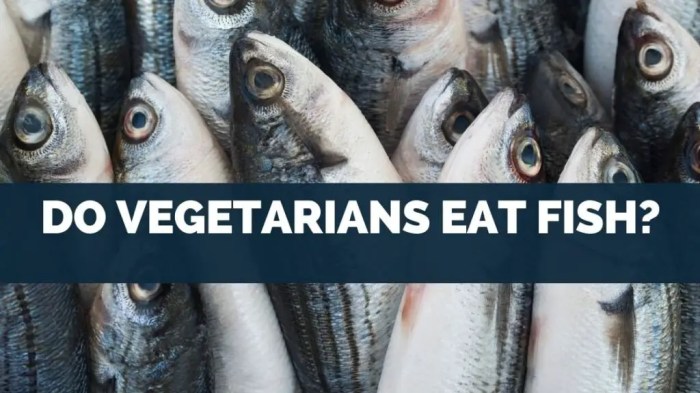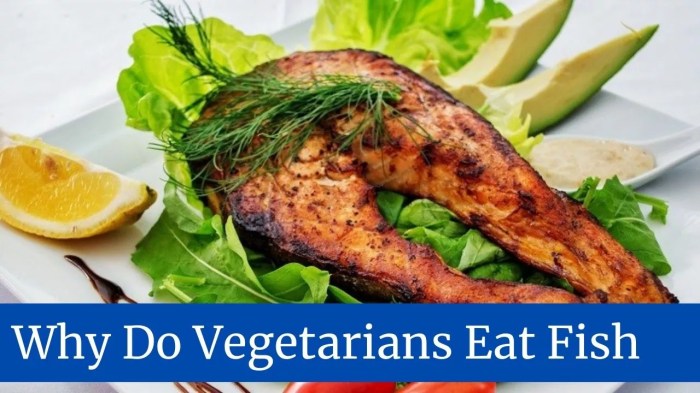Why do some vegetarians eat fish? This question opens up a world of unexpected motivations and beliefs that challenge traditional definitions of vegetarianism. Dive into the intriguing reasons why some vegetarians incorporate fish into their diets, exploring the nutritional benefits, cultural influences, and ethical considerations that shape their choices.
Why do some vegetarians eat fish?

Vegetarianism is generally defined as a diet that excludes meat, poultry, and other animal products. However, some individuals who identify as vegetarians choose to include fish in their diet.
There are several reasons why some vegetarians may eat fish. Some believe that fish are not considered animals, while others view fish as a healthier alternative to meat. Additionally, some vegetarians may eat fish for cultural or religious reasons.
If you’re looking for a healthier lifestyle, considering a plant-based diet might be a great choice. One popular option is the vegetarian or pescetarian diet. While vegetarians abstain from all animal products, pescetarians include fish and other seafood in their diet.
Both options offer numerous health benefits, including reduced risk of heart disease, stroke, and certain types of cancer.
Pescatarianism
Pescatarianism is a type of vegetarian diet that includes fish and other seafood. Pescatarians typically avoid eating meat, poultry, and other animal products, but they may consume dairy products and eggs.
There are several reasons why someone might choose to adopt a pescatarian diet. Some people believe that fish is a healthier alternative to meat, as it is typically lower in saturated fat and cholesterol. Others may choose to eat fish for environmental reasons, as fish farming has a lower environmental impact than raising livestock.
Nutritional benefits of eating fish for vegetarians

Fish is a rich source of essential nutrients that are important for vegetarians. These nutrients include protein, omega-3 fatty acids, vitamin D, and vitamin B12.
Protein
Protein is an essential nutrient that is required for the growth and repair of tissues. Fish is a good source of high-quality protein that is easily digestible. One 3-ounce serving of cooked fish provides about 20 grams of protein.
Omega-3 fatty acids
Omega-3 fatty acids are essential fatty acids that are important for heart health, brain function, and eye health. Fish is a good source of omega-3 fatty acids, particularly EPA and DHA. One 3-ounce serving of cooked fish provides about 1 gram of EPA and DHA.
Vitamin D
Vitamin D is a nutrient that is important for bone health. Fish is a good source of vitamin D, particularly fatty fish such as salmon, tuna, and mackerel. One 3-ounce serving of cooked salmon provides about 400 IU of vitamin D.
Vitamin B12, Why do some vegetarians eat fish
Vitamin B12 is a nutrient that is important for the production of red blood cells. Fish is a good source of vitamin B12, particularly shellfish such as clams, oysters, and mussels. One 3-ounce serving of cooked clams provides about 80 mcg of vitamin B12.
The nutritional value of fish compares favorably to other vegetarian sources of protein and omega-3 fatty acids. For example, a 3-ounce serving of cooked fish provides more protein than a 3-ounce serving of cooked beans or lentils. Fish also provides more omega-3 fatty acids than a 3-ounce serving of flaxseed or chia seeds.
Environmental and ethical concerns related to fish consumption: Why Do Some Vegetarians Eat Fish

Fishing and aquaculture practices have a significant impact on the environment. Overfishing, the practice of catching fish at a rate faster than they can reproduce, can lead to the depletion of fish populations and disrupt marine ecosystems. Destructive fishing methods, such as bottom trawling, can damage coral reefs and other marine habitats.
Aquaculture, the farming of fish and other aquatic organisms, can also have negative environmental impacts, such as pollution from fish waste and the use of antibiotics.The treatment of fish in fishing and aquaculture practices also raises ethical concerns. Fish are sentient beings capable of experiencing pain and suffering.
Whether you’re a seasoned vegan or a curious carnivore, the decision between a vegetarian or pescetarian lifestyle can be a transformative one. While both diets emphasize plant-based nutrition, pescetarians incorporate seafood into their meals, offering a wider range of nutrients and flavors.
Understanding the nuances of each approach can empower you to make an informed choice that aligns with your health goals and ethical values.
Many fishing methods involve the use of painful hooks or nets that can cause injury or death to fish. In aquaculture, fish are often kept in crowded and unsanitary conditions, which can lead to disease and stress.
Cultural and social factors influencing fish consumption among vegetarians
Cultural and social norms play a significant role in shaping the dietary choices of vegetarians. In some cultures, vegetarianism is deeply rooted in religious or ethical beliefs, which may prohibit the consumption of all animal products, including fish. In other cultures, vegetarianism may be more flexible, with some vegetarians choosing to include fish in their diets.
Personal beliefs and social interactions can also influence whether or not vegetarians eat fish. Some vegetarians may choose to eat fish because they believe it is a healthy source of protein and omega-3 fatty acids. Others may choose to eat fish because it is a socially acceptable way to participate in meals with non-vegetarian friends and family.
The role of cultural and social norms
- In some cultures, vegetarianism is deeply rooted in religious or ethical beliefs, which may prohibit the consumption of all animal products, including fish.
- In other cultures, vegetarianism may be more flexible, with some vegetarians choosing to include fish in their diets.
The role of personal beliefs and social interactions
- Some vegetarians may choose to eat fish because they believe it is a healthy source of protein and omega-3 fatty acids.
- Others may choose to eat fish because it is a socially acceptable way to participate in meals with non-vegetarian friends and family.
Last Point
The decision of whether or not to eat fish as a vegetarian is a complex one, influenced by a multitude of factors. By understanding the motivations, nutritional considerations, and ethical concerns surrounding this topic, we gain a deeper appreciation for the diverse perspectives and choices within the vegetarian community.
FAQ Overview
Can vegetarians eat all types of fish?
Some vegetarians choose to consume only certain types of fish, such as those that are sustainably sourced or considered to have a lower environmental impact.
Do vegetarians who eat fish still consider themselves vegetarians?
The definition of vegetarianism can vary, and some individuals who consume fish may identify as vegetarians while others may prefer the term pescatarian.
What are the main nutritional benefits of eating fish for vegetarians?
Fish provides essential nutrients such as omega-3 fatty acids, vitamin D, and protein, which can be important for vegetarians who may not get these nutrients from other sources.